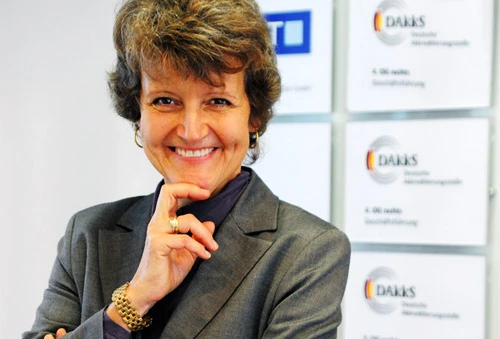When the testers are tested
Accreditation for Adlershof companies and institutions
“Accreditation is always a competitive advantage,” explained Professor Jürgen Leonhardt, head of the Adlershof based Institut für Umwelttechnologien (IUT) GmbH. Leonhardt’s company has verifi ed in the form of accreditation that its physical and physical-chemical examinations of waste water, water, slurry, and sediments comply precisely with the applicable standards, guidelines, and laws. “Certain calls for tenders,” confi ded Leonhardt, “allow only accredited companies.”
Accreditation is also the strength of other Adlershof companies and institutions, for example SLM Speziallabor für angewandte Mikrobiologie GmbH and the Federal Institute for Materials Research and Testing (BAM). Accreditation is awarded by the DAkkS, the German accreditation body. Following a European ordinance stipulating that there could be only one accreditation body in each EU nation, this body was set up in early 2010 and assigned the work that had previously been assigned to about twenty private and state bodies. With head office in Berlin-Mitte, the DAkkS is funded by the Federal Republic of Germany and the BDI Federation of German Industry (BDI).
“We test the testers,” replied Andrea Valbuena, head e.g. of the DAkkS department for the environment and chemistry, when asked to summarise the institute’s tasks. In the jargon, these testers are called Conformity Assessment Bodies. These are laboratories, inspectorates, and certification bodies – in other words, they are all bodies that for their part examine products or procedures. Accreditation must be applied for at the DAkkS and is associated with a highly complex procedure with costs.
First the DAkkS examines the relevant documentation submitted in writing. “The most important of all though is the onsite appointment,” explained Valbuena. Consisting mostly of three to four persons, the expertise team at the subject company’s head office scrutinises the employees’ training levels and skills and the quality of the equipment. “In most cases,” added Valbuena, “we identify potential for improvement.”
When the subject of the Conformity Assessment Body is seen to fulfil the requirements, it is awarded the accreditation certificate. This is valid for five years. However, after only one year the DAkkS examines again whether the quality standard is still being observed. After five years the procedure must be repeated from the beginning. Jürgen Leonhardt of IUT is convinced: “We’ll be applying for accreditation again.”
by Christian Hunziker
